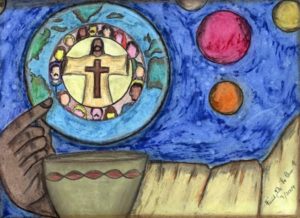Jun 19., 2022 / General, Homilies, Soul Food
Solidarity
Homily on Solemnity of the Body and Blood of Christ | 18 June 2022
by Fr Tony Moreno, SJ
“You Filipinos eat five times a day” – a Jesuit tertian from overseas tells me. I was struck to hear this. But actually, at times, it is six times a day we eat if we include the midnight snacks. Eating is a human activity not only to satisfy one’s hunger. It is an expression of fellowship or solidarity. Eating alone is fine, now and then, but if one eats alone all the time, one begins to wonder what is happening.
In the eyes of the self-righteous, one unacceptable deed of Jesus is eating with sinners and tax collectors. He breaks the barrier that separates the sinners from the rest of the community by having meals with the unclean and ostracized. Note also the parable of the loving father, after the father and son reconcile, there is a celebration. There is a grand party, much to the dismay of the elder brother. The meal becomes a gesture of solidarity. It is the same spirit behind the Gospel today. The feeding of the multitude is important for Jesus because it is a perfect ending after healing the sick. While his disciples were quick to dismiss them, Jesus finds a way to feed them and celebrate. There is fellowship and solidarity.
In Jewish custom, the passover meal is a celebration of God’s liberating power. The night before exodus is a solemn one for God shows the saving power never before the Jewish people have experienced. God enters their world to accompany them. This is a great expression of solidarity.
As we celebrate the Solemnity of the Most Holy Body and Blood of Christ, we likewise call to mind the greatest act of solidarity for all time, God’s unbreakable love for all of us. Jesus uses the meal as an eternal symbol of God’s indwelling in our midst. It is no longer the lamb that we partake but Jesus himself. It is no longer simply a nation (such as the Jewish people) that God commits to love but the whole of humanity and creation including you and me. Jesus becomes food and drink for the nourishment of our life and mission. He commands us: “Do this in memory of me.” He asks us to bring to life the message of God’s unbreakable love. Forgetfulness of God’s enduring love is a great sin. It is an act of ingratitude.
Our continuing fragmentation and division as a people is an indication that the wounds of hatred and sin are still there. We partake of Jesus’ body and blood, he lives on in us, but at times, our lives are so marked by hatred and intolerance. Sadly this is still happening in our society after the elections. Ironically, last April, after celebrating 500 years of Christianity in our country it was a moment of grace, but in no time, we showed to the whole world how much we hated those who did not share our political preference. I see good friends who are no longer on speaking terms. I see siblings and relatives who have become enemies. Pardon becomes difficult to ask and equally difficult to give. This runs counter to the spirit of our celebration today.
Our celebration of the Most Holy Body and Blood of Christ such as this Eucharist we are celebrating cannot be simply a personal or private act without anything to do with building our community. It can bring us closer as a community. It can heal our brokenness as a people as we call to mind God’s unbreakable solidarity and love for us.
May our celebration of the meal of Jesus be a summit and source of healing and reconciliation. It is the highest form of solidarity which can heal hatred and division.










